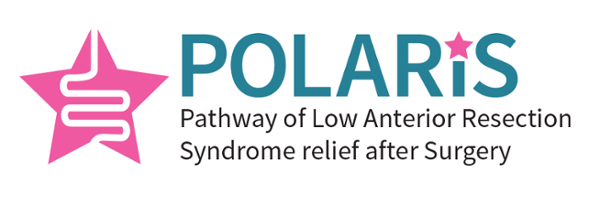POLARiS

Study details
- Short title: Pathway Of Low Anterior Resection syndrome relief after Surgery (POLARiS) trial
- Study design: A prospective, international, open-label, multi-arm, phase 3, randomised superiority trial, embedded within a cohort (TWiCs), with internal pilot phase, qualitative sub-study and economic evaluation
- Chief Investigator: Mrs Julie Cornish & Prof Aaron Quyn
- Sponsor: Cardiff and Vale University Health Board
- REC approval: TBC
- IRAS: TBC
- Funding: NIHR HTA (value £1,848,418.85)
- Trial registration: TBC
- Study protocol: TBC
Plain English Summary
14,000 cases of rectal cancer are diagnosed in the UK per year. The treatment for advanced rectal cancer is often radiotherapy+/-chemotherapy treatment followed by surgery. This provides good outcomes, with the cancer returning in less than 10% of people. However, the surgery can cause significant long-lasting problems, including problems with bowel, sexual and urinary function.
Low anterior resection syndrome (LARS) is a collection of symptoms that people who have undergone a partial or total removal of the rectum may experience, including bowel incontinence or leakage, frequency or urgency of stools, loose stools and incomplete bowel emptying. These symptoms can have a considerable negative impact on patient quality of life and daily functioning. As a result, there is a need to focus efforts on survivorship. LARS symptoms are present in 75% of the patients up to 12 months after surgery and remain in up to 50% of patients for more than 10 years with a major impact on quality of life.
There is little evidence to support treatment options for patients with LARS. Despite more acceptance of LARS amongst clinicians, with increased subspecialisation of surgeons and poor reporting of LARS, many centres do not have a clear management pathway and/or are unaware of the treatments available.
Transanal irrigation (TAI) is a method of managing conditions such as bowel incontinence or constipation. It involves introducing water through the anus to flush faeces (poo) from the bowel.
Sacral Neuromodulation (SNM) involves a small battery powered unit being implanted into the lower back. This is connected to electrodes which rest on the nerves in the lower spine. The device continuously sends electrical impulses to the nerves and muscles that control the lower bowel (rectum and anus). These two treatment options may improve quality of life for patients with LARS, however supportive evidence is currently lacking.
The POLARiS trial will investigate the clinical and cost benefit of two treatments for patients with major LARS who have previously undergone standard non-surgical treatment without improvement. Patients who are not randomised to SNM or TAI will be offered optimised medical management. The study will monitor the bowel function and quality of life in patients who have undergone rectal cancer surgery in the hospitals involved within the last 10 years of the trial commencing. Those patients found to have poor bowel function (major LARS) will be randomised to one of the treatment options and followed up for 2 years after randomisation.
The results of the study will be presented at conferences raising awareness of effective treatment options to clinicians, as well as through publication in peer reviewed journals. Patient material will be developed as part of the output of POLARiS which will offer self-management strategies and explanation of treatment options for patients with LARS. The findings of the study will be highlighted through social media to patient groups and relevant charities. This will inform patients and the public that LARS is treatable and which treatment options are potentially available. Patients who have participated in the study will receive a patient report at the end, with clear outlines of the findings.
CEDAR’s role
CEDAR is responsible for the following elements of the study:
- Health Economics
- Qualitative outcomes
- Process Evaluation